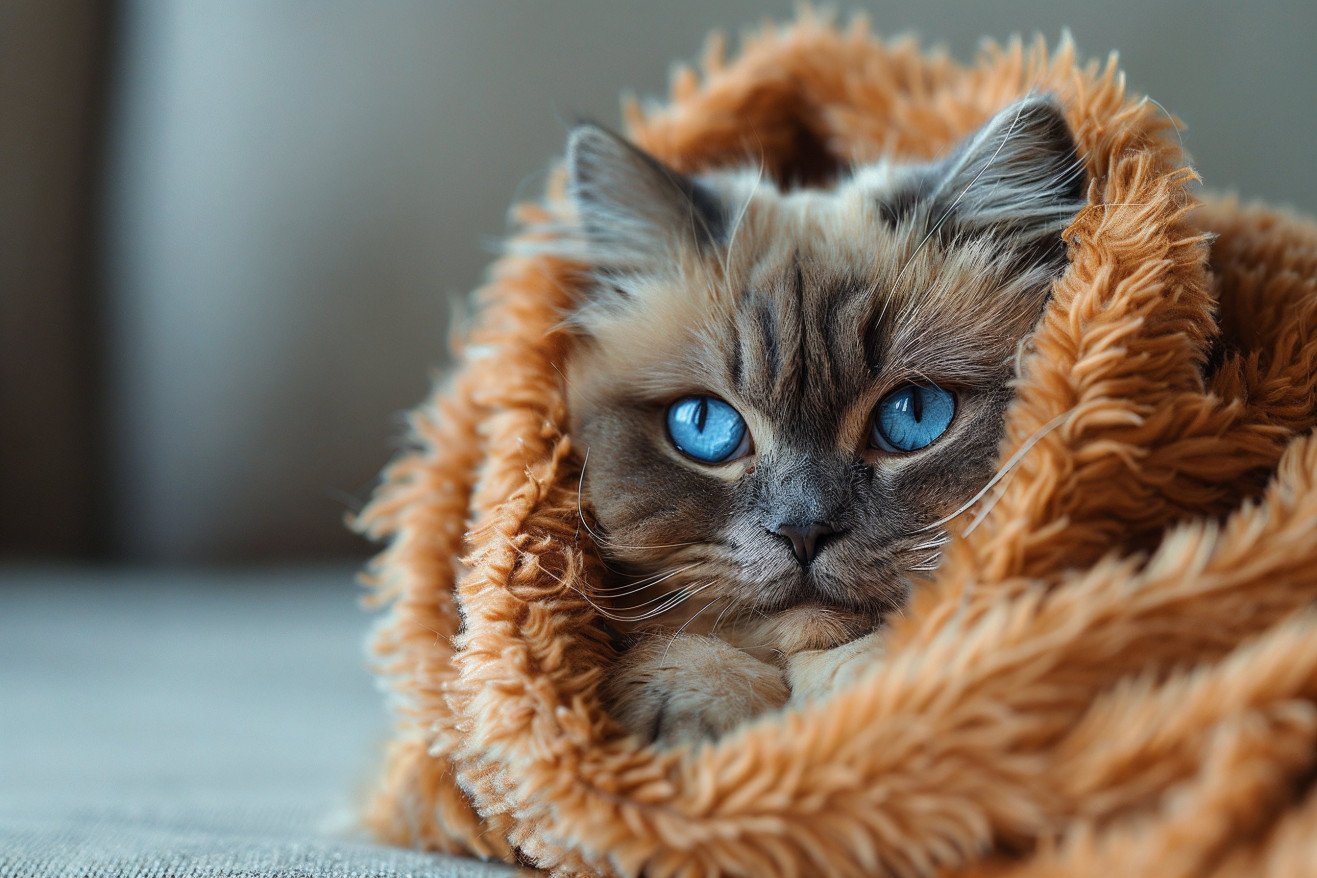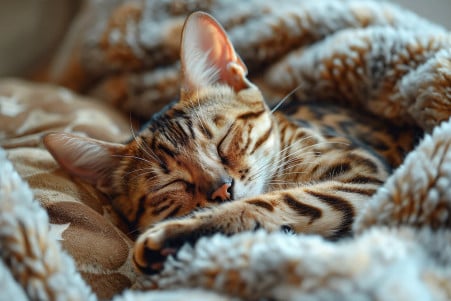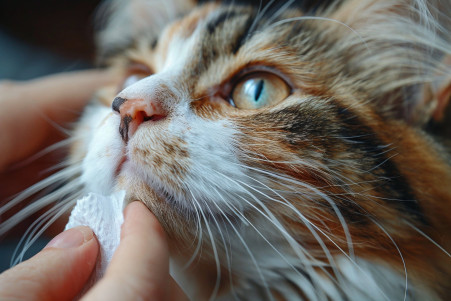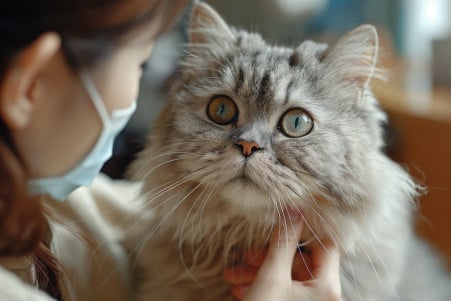Do Cats Get Colds? What to Know About Feline Upper Respiratory Infections
2 March 2024 • Updated 2 March 2024

While it may seem like a human-specific issue, cats can also get the sniffles. In fact, cats can get colds, which are called Feline Upper Respiratory Infections (URIs). The symptoms are similar to those in humans and include sneezing, congestion, and runny eyes. URIs are typically caused by viruses and are highly contagious between cats, but they are usually easy to treat and don’t spread to people.
To learn more about this common cat health problem, we referenced veterinary sources, scientific research, and animal experts to find out more about the symptoms, diagnosis, and treatment of cat colds. We also looked into how to prevent URIs to keep our pets healthy and the role of the immune system. This information will be especially helpful for cat owners who want to make sure their pets are as healthy as possible.
Do cats get colds?
Diagnosing Cat Colds
The first thing a vet will do when diagnosing a cat cold is to perform a physical exam, looking for signs of sneezing, congestion, and eye or nasal discharge. According to the Cornell University College of Veterinary Medicine, vets will often take swab samples from the mouth, throat, or eyes to determine the specific pathogen causing the infection.
According to PetMD, blood tests and X-rays can also be used to confirm the diagnosis, especially if the infection is severe or doesn’t respond to initial treatment.
The cat’s medical history is also important in diagnosing the condition. The symptoms and physical exam findings, such as fever, loss of appetite, and lethargy, can help the vet determine how severe the infection is. In addition, the vet can determine if the cat has a cold or another respiratory condition based on the type of discharge (clear or colored) and if the cat has mouth ulcers or signs of respiratory distress.
WebMD says that the most common causes of cat colds are the Feline Herpes Virus and Feline Calicivirus. These viruses have different characteristics and can affect cats of all ages, especially those that live in crowded conditions or have weakened immune systems. Knowing the specific cause of the infection is important for managing the disease and preventing its spread in cat populations.
How Feline Colds Are Spread
Feline upper respiratory infections are spread through a number of different pathways. While direct contact with an infected cat is the most common way to spread the infection, indirect contact through aerosolized droplets and fomite objects like food bowls or toys can also spread infectious agents.
According to VCA Animal Hospitals, the viruses that cause upper respiratory infections, including Feline Herpesvirus and Feline Calicivirus, are highly contagious and are spread through saliva or nasal and ocular discharges.
Environmental factors also play a big role in the spread of feline colds. A study published in PLoS One found that overcrowding, like in shelters, and stress are both associated with increased susceptibility and outbreaks of infections. As a result, isolating infected cats and maintaining good hygiene are important in multi-cat environments to prevent the spread of colds.
Cats have an incubation period of 2–10 days between exposure and the onset of clinical signs. A study published in PMC showed that cats can shed the virus to other cats during the period of active infection, which typically lasts 7–21 days.
However, these viruses are species-specific and pose no risk to humans, so cat owners can care for their sick pets without worrying about getting sick themselves. However, pet owners should be on the lookout for signs of illness in their cats so they can intervene and provide care as soon as possible.
How to Get Your Cat the Help They Need
If your cat has a cold, the main treatment is supportive care. This includes making sure your cat is warm and comfortable and making sure they’re getting enough fluids.
International Cat Care also notes that steam inhalation can help with nasal congestion and that feeding your cat soft, smelly food can help with their appetite. Some medications, like antiviral drugs or interferons, can help with symptoms even if they don’t directly fight the viruses, so they are also considered supportive care.
Veterinarians can also prescribe antibiotics to treat the secondary bacterial infections that often come with feline upper respiratory infections. However, Cornell University College of Veterinary Medicine warns that these should only be used under the guidance of a vet, as misuse can lead to antibiotic resistance.
Another treatment that is often used for Feline Herpesvirus, one of the viruses that causes cat colds, is lysine supplementation. However, a study in PMC found that lysine supplementation is not effective, and the researchers recommended against using it to treat this infection.
It may also be necessary to isolate the cat and clean the environment to prevent the spread of the infection. Cornell University recommends cleaning food and water bowls and litter boxes with bleach-based disinfectants to kill the virus.
If your cat’s symptoms don’t improve or get worse, it’s important to take them to the vet. While home treatments may help your cat feel better in the short term, they are no substitute for a vet’s care and diagnosis. As your cat recovers, also keep an eye out for any signs of long-term issues, as this could be a sign of a more serious problem.
Long-Term Effects: The Lasting Impact of Cat Colds
If not treated in a timely manner or if they recur, feline upper respiratory infections can result in long-term issues. Chronic rhinitis and gingivitis are two of the most common long-term effects.
VCA Animal Hospitals explains that chronic rhinitis results in ongoing nasal discharge and facial pain, which can eventually result in a loss of appetite and weight loss. Meanwhile, Purina says that gingivitis can cause severe pain in the mouth and may require teeth to be removed.
The Merck Veterinary Manual warns that it’s important to treat feline herpesvirus infections quickly and effectively to avoid these complications. If left untreated, these infections can result in permanent damage to the nasal passages, chronic rhinitis, and secondary bacterial infections that make the condition worse.
In addition, some cats will become carriers of the virus after they’ve recovered and will be able to spread the infection to other cats, which can have a major impact on the health of the infected cat and the health of other cats in the area.
Cat parents should watch for signs of long-term issues after their cat has recovered and make sure to continue to offer their cat the support and care they need to manage any long-term complications. With careful attention and the right care, cat parents can ensure their cats are comfortable after they’ve recovered.
Boosting the Immune System: How Cats Can Fight Off Colds
The immune system is the first line of defense against the common cold in cats. PetCareRx explains that a healthy diet that includes antioxidants, fatty acids, proteins, and amino acids is important to support the immune system in cats.
Vitamins A, C, and E and omega-3 fatty acids are especially important for protecting against environmental pathogens and preventing disease. In addition, exercise and a stimulating environment that includes toys and plenty of space can help support the immune system.
While some cats may benefit from immune system support, it’s important to talk to a vet before giving a cat any supplements. This is especially true when it comes to L-lysine, which VCA Hospitals says is a controversial supplement.
Regular vet visits and vaccinations, including the distemper vaccine, are also important for protecting cats from the viruses that cause the common cold, including herpesvirus, and for reducing the severity of the illness if they do become infected.
In addition, stress management is important for immune system support, as cats that are stressed are more likely to get sick. Stress management techniques include environmental enrichment and the use of synthetic pheromones, according to PetWellClinic. By making sure that these things are in place, cat owners can help their pets fight off colds and stay on the path to a healthy, happy life.
A Healthy Cat Is a Happy Cat: What You Should Know About Cat Colds
In this article, we’ve discussed how cats can get colds, which can lead to symptoms like sneezing and watery eyes. Feline upper respiratory infections, which are often caused by viruses like feline herpesvirus and feline calicivirus, are highly contagious to other cats but not to humans.
It’s important to recognize the symptoms of these infections as soon as possible so that you can get an accurate diagnosis and treatment, which may include supportive care, medications, and, in some cases, quarantine.
Prevention is the best medicine, and a cat’s immune system is their first line of defense. Cat parents can help keep their cats healthy by making sure they get the right nutrition, exercise, and stress relief. And, of course, part of keeping a cat healthy is making sure they get regular veterinary care, including check-ups and vaccinations.
By learning about feline colds, cat parents can make sure they’re taking care of their pets in a way that helps them live long, happy lives. And don’t forget, the best way to keep your cat healthy is to make sure you’re taking care of them every day in a way that helps prevent illness and supports their overall health and well-being.


